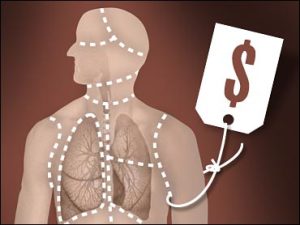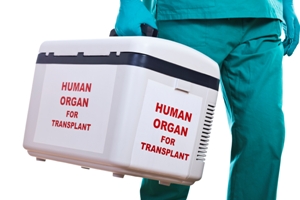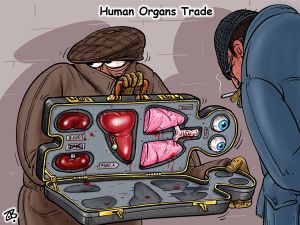
By Saman Ansari
Organ transplantation is the moving of an organ from one body to another patient’s body (located somewhere else), to replace the recipient’s damaged or absent organ. This has improved the quality of life and has saved life of millions of patients across the globe. Organ transplant technologies have also created a vast and growing market for a supply of organs.
Besides its benefits, organ transplantation has given birth to two extremely important bioethical concerns. First being the case of retrieving organs from non living donors to meet this growing demand of organs in the market. This is happening in Europe and the United States. Doctors often declare someone non living once their brain has stopped functioning, however in Islamic Shariah Law, the heart must stop beating before someone is legally declared dead. Therefore, Muslim countries prohibit the procurement of organs from the non living and instead rely upon living donors both related and non-related to the recipient as a source of organs supply. This is the case in Egypt, Iran and Syria. Some Muslim countries such as the United Arab Emirates prohibit transplants within the country entirely.
 Where Organ Trafficking comes in
Where Organ Trafficking comes in
The second issue is that of organ trafficking. As the global market dealing with organ continues to expand, an increasing dependence upon commercial donors (rather than non living and living related donors) is on the rise. This is done via sophisticated international brokers; identified health, economic, social, and psychological consequences for donors; a compromised ability to continue manual labor jobs; incomplete payment of the agreed price for an organ sale; and a lack of donor follow-up and general welfare concern.
The international trade in human organs, particularly kidneys, has especially flourished in developing countries, where organs from non living donors are not adequate or available and where there are marked disparities in wealth. For example, Persian Gulf countries with transplant programs have no or very low numbers of non living donor ship and patients from these countries have relied heavily on poor commercial living donors from countries such as India, Pakistan, the Philippines, Eastern Europe, and increasingly China, as suppliers of human organs.
An example of this is, that the Egyptian law requires that donors and recipients must share the same nationality in order to obtain a license for a transplant in Egypt and the vast majority of donors are poor Egyptians who resort to commercial living organ donor ship.
Why Organ Trafficking Exists
As non living donor ship is almost non-existent in the Islamic World, a study on issues of renal transplantation in Middle Eastern countries identified several different problems. Some of these include considering a commercial living donor as an “easy way out”. There is also a lack of effective health insurance and a minorities’ lack of trust in the health system and this is the reason why Middle Eastern people resort to organ trafficking.
In spite of everything, the case of the Islamic Republic of Iran is a bit different. Iran is the only country worldwide that legalizes commercial kidney donor ship and the state compensates donors for a kidney donation. This policy is a state attempt to fill the demand for kidneys and standardize the low prices. However, according to Iranian specialists, even this has not fulfilled Iran’s rising kidney transplant demand.
 Organ Trafficking is not Islamic
Organ Trafficking is not Islamic
Majority of Muslim scholars have agreed that organ donation is permitted based on the conditions that it will help the recipient with certainty, it does not cause harm to the donor and the donor donates the organ or tissue voluntarily and without financial compensation. This closes all doors of confusion that organ trafficking is indeed unethical even with respect to the Islamic guidelines. The Islamic Shariah also strongly discourages organ trafficking marking it as a serious exploitation of human rights.
Despite such rulings, transplant doctors in Egypt estimate that at least 90% of kidney donors are in fact unrelated, recruited, and compensated. The number of licensed kidney transplants is estimated between 500-1,000 per year. A small number of partial liver transplants are performed annually in Egypt. Among requirements for obtaining a transplant license, a patient must state that there are no suitable related donors available when unrelated donors are presented and both the donor and patient must state that donorship is voluntary and “gifted,” (i.e. not compensated).
Organ Trafficking Outside the Muslim World
The case of organ trafficking is equally worse outside the Muslim World. According to Britain’s leading newspaper, ‘The Guardian’ contacted an organ broker in China who advertised his services under the slogan, “Donate a kidney, buy the new iPad!” He offered £2,500 for a kidney and said the operation could be performed within 10 days.
According to the World Health Organization, 10,000 black market operations involving human organs take place each year and that kidneys make up 75% of the global illicit trade in organs. Rising rates of diabetes, high blood pressure and heart problems are causing the demand for kidneys to far outstrip supply.
Data from WHO shows that of the 106,879 solid organs known to have been transplanted in 95 member states in 2010 (legally and illegally), about 73,179 (68.5%) were kidneys. But those 106,879 operations satisfied just 10% of the global need.
Conclusion
Despite Islamic and other bioethical guidelines and laws against it, the organ trade still thrives globally, including in the Muslim world. Putting to practice the Islamic Shariah jointly with other Islamic and bioethical statements, can together find solutions to the problems of exploitation as in the current practices of organ trafficking, particularly in the Muslim world.
This serious reality regarding trafficking of human organs and particularly the severe consequences it has for organ donors, has encouraged an initiative towards an applied ethics of Islamic and other ethical guidelines that speak against it. The Coalition for Organs-Failure Solutions (COFS) is a non-profit health and human rights organization committed to combating organ trafficking and ending the exploitation of the poor as a source of organ supplies. COFS consists of multi-disciplinary experts including Islamic and other medical ethicists, medical professionals, social scientists, policy analysts, and human rights activists and lawyers, predominantly from the Middle East and other Muslim countries. COFS has been working in the Middle East since 2006 with special attention to Egypt and the unique circumstances of the organ trafficking situation there.
Let’s hope this will help decrease this vast yet unethical problem and bring about an organ exploitation free future.
References:
Budiani, Shibley (2006) Islam, Organ Transplants, and Organs Trafficking in the Muslim World: Paving a Path for Solutions. Muslim Medical Ethics: Theory and Practice.
You must be logged in to post a comment.